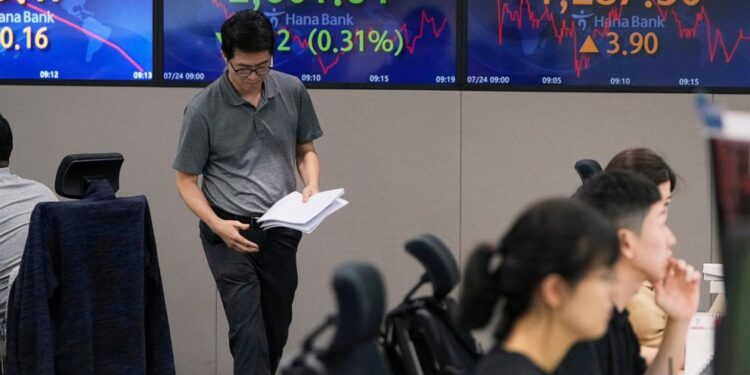Asian shares have advanced after Wall Street closed out another winning week
Asian shares advanced on Monday after Wall Street closed out another winning week.
Hong Kong declined but other major markets in the region were higher. U.S. futures edged lower and oil prices also fell.
The Federal Reserve is widely expected to raise its federal funds rate on Wednesday to its highest level since 2001. Investors are hoping that might be the final increase of the tightening cycle because inflation has been cooling since last summer. The federal funds rate started 2022 at virtually zero.
This week markets also are watching for the outcome of a major political meeting in China that might bring more measures to prop up slowing growth in the world’s second largest economy.
“Recent stimulus measures to boost consumption of automobile and electronics items failed to provide much conviction that they will be sufficient to uplift the downbeat growth conditions, with mounting hopes on the China Politburo meeting this week for more follow-through,” Yeap Jun Rong, a market analyst at IG, said in a commentary.
The Bank of Japan will hold a policy meeting which is not expected to yield major changes to the country’s ultra-lax monetary stance.
Tokyo’s Nikkei 225 index added 1.2% to 32,696.65, while the Hang Seng in Hong Kong dropped 1.4% to 18,808.59.
The Shanghai Composite index edged 0.1% higher to 3,170.30. In Seoul, the Kospi gained 0.4% to 2,621.56. Australia’s S&P/ASX 200 was up 0.1% at 7,319.60.
The SET in Bangkok picked up 0.2% and the Sensex in India was up less than 0.1%.
On Friday, stocks on Wall Street found some stability after sliding the day before.
The earnings reporting season has been gaining momentum, with the majority of companies reporting better results than expected.
The S&P 500 edged up by 0.1%, to 4,536.34, capping its eighth winning week in the last 10. The Dow Jones Industrial Average added less than 0.1% to 35,227.69, its 10th gain in a row. The Nasdaq composite slipped 0.2% to 14,032.81 a day after tumbling to its worst loss in more than four months.
Roper Technologies rallied 3.7% for one of the larger gains in the S&P 500 after it reported better profit and revenue for the spring than analysts expected. The company, which looks to dominate niche tech markets, also raised its financial forecasts for the full year.
On the losing side of Wall Street was American Express, which fell 3.9%. It reported stronger profit for the spring than expected, but its revenue fell short of forecasts.
The stock market has generally been on a tear this year, with the benchmark S&P 500 up 18.1%, as the economy has defied predictions for a recession. It’s so far powered through much higher interest rates meant to bring down inflation, and the hope is that it may outlast the Federal Reserve’s rate-hike campaign.
The Fed is widely expected to raise its federal funds rate on Wednesday to its highest level since 2001. But the hope is that will be the final increase of the cycle because inflation has been cooling since last summer. The federal funds rate started last year at virtually zero.
This week, three of the “Magnificent Seven” companies behind the majority of the S&P 500’s gains this year, Alphabet, Facebook parent company Meta Platforms and Microsoft will report their earnings. Expectations are high after they all soared more than 35% so far this year.
The top stocks have become so big and their movements have become so influential over the market that Nasdaq was rebalancing its Nasdaq 100 index before trading was to begin Monday to lessen the impact some stocks have on the overall index.
The seven stocks, which also include Amazon, Apple and Nvidia, are collectively trading with stock prices that are 44 times higher than their earnings per share over the last 12 months, according to Savita Subramanian, equity strategist at Bank of America.
In other trading Monday, U.S. benchmark crude oil slid 14 cents to $76.93 per barrel in electronic trading on the New York Mercantile Exchange. It picked up $1.42 on Friday to $77.07 per barrel.
Brent crude, the pricing basis for international trading, declined 15 cents to $80.92 per barrel.
The dollar fell to 141.47 Japanese yen from 141.68 yen. The euro slipped to $1.1120 from $1.1128.
Source: abcNEWS




Recent Comments